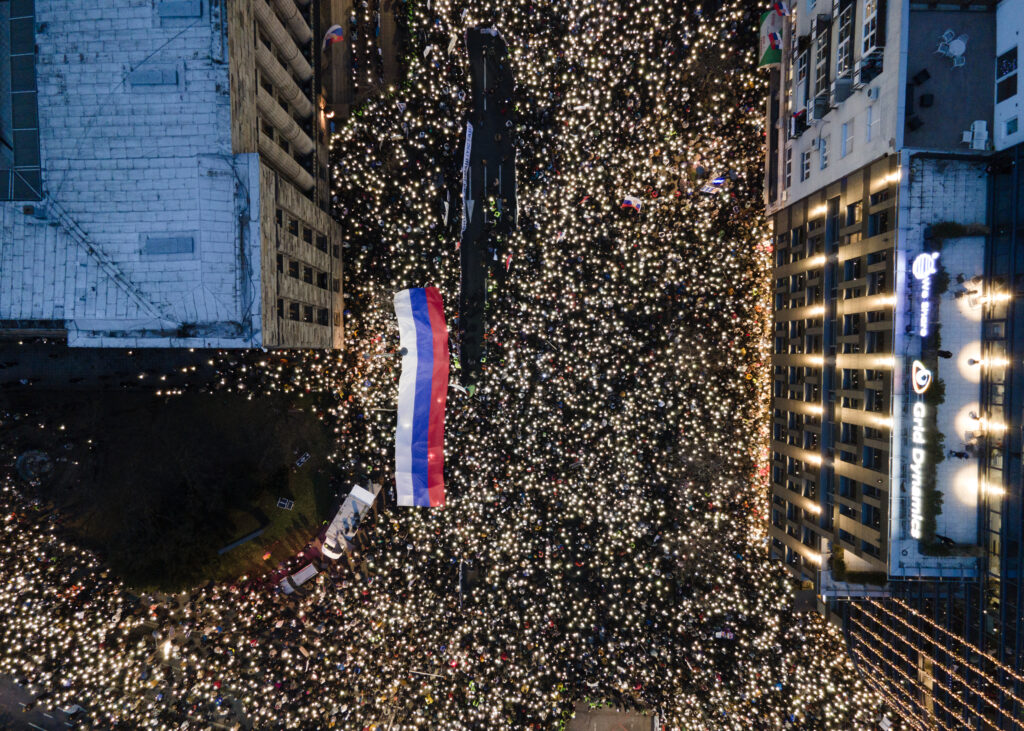Brussels – Kosovo to the polls. Next Sunday’s (Feb. 9) elections mark a key moment in the political life of the young Balkan nation and represent a de facto personal referendum on Premier Albin Kurti, who is being challenged by the parliamentary opposition, which, however, remains disunited. The election outcome will most likely determine Pristina’s international alignment for the coming years, especially concerning relations with Belgrade.
Outgoing Prime Minister Albin Kurti is the first to reach the end of his term since the country declared its independence from Serbia in 2008. Four years ago, in February 2021, the leader of the centre-left Movement for Self-Determination (Vetëvendosje, VV) surprisingly overwhelmed his opponents, winning over 50 per cent of the vote. Now, he wants to repeat the blow.
Kurti is widely accused of not having worked hard enough to obtain broader diplomatic recognition for Kosovo. This is mainly due to tensions with neighbouring Serbia, which critics say the head of the government in Pristina has intentionally reignited during his tenure. He branded Belgrade a proxy for Moscow and complained about the Western attitude toward the Serbian authorities, which he deemed overly accommodating. His election campaign is mainly focused on combating corruption, full national independence, and wall-to-wall relations with Serbia.
His main challengers are Bedri Hamza, candidate of the Democratic Party of Kosovo (Partia Demokratike e Kosovës, PDK), and the leader of the Democratic League of Kosovo (Lidhja Demokratike e Kosovës, LDK) Lumir Abdixhiku. The liberal-conservative LDK, which won 17 per cent of the vote four years ago, is focusing its campaign on economic reforms and strengthening Pristina’s international relations. A more balanced approach to relations with Belgrade is also being proposed by the centre-right LDK (12.7 per cent of the popular vote in 2021), with Abdixhiku arguing for the need to rebuild the country’s credibility in general and relations with the West in particular.

According to the polls, Kurti’s VV is still firmly in the lead in voting intentions, with a virtual 52 per cent of support, while the PDK and LDK trudge more than 30 points behind, placing them at 19 and 15 per cent, respectively. Opposition forces, including the Alliance for the Future of Kosovo (Aleanca për Ardhmërinë and Kosovës, AAK), which hovers around 8 per cent, have so far failed to forge a united front against the outgoing premier, given the rivalry that persists between the parties.
If the VV does not win an absolute majority, it will have to form a coalition, in which case a crucial bargaining chip could become the presidency of the Republic. Kurti’s party partner, Vjosa Osmani, currently holds the post, but her term expires in April 2026.
Of the 120 seats in the Kuvendi, the single-chamber parliament in Pristina, 20 are reserved for ethnic minorities, including 10 for the Serbian one. Last December, the Kosovo Central Electoral Commission banned the Serbian List (Srpska list) from competing the day after tomorrow, but the Electoral Complaints Commission (PZAP) later overruled the decision.
The appointment with the ballot box comes at a time of particular international geopolitical tension, which is also reflected in the region. In addition to the massive protests underway in Serbia, where hundreds of thousands of citizens are asking for the resignation of President Aleksandar Vučić, adding uncertainty in the Western Balkan context is also the new line taken in foreign policy by the White House after the return of Donald Trump. The shocking decision to freeze USAID operations around the world strongly questions the U.S. presence in this corner of Europe, where Euro-Atlantic integration has historically played a key role in countering the influence of other actors, especially Vladimir Putin‘s Russia.
Belgrade-Pristina Dialogue: @EUCouncil appoints Peter Sørensen as EU Special Representative @EUSR_Dialogue, replacing @MiroslavLajcak as of 1 Feb. for initial 13 months, to achieve comprehensive normalisation of the relations between Serbia & Kosovo(*)
https://t.co/rnhXhRtrar— EU Council Press (@EUCouncilPress) January 27, 2025
In late January, Danish diplomat Peter Sørensen was named new EU special representative for the Belgrade-Pristina dialogue. The process has stalled for some time, given the Kosovar government’s less-than-conciliatory moves toward the Serb minority living in the country’s north, contributing to a general tightening of relations.
Five of the Union’s member states—Cyprus, Greece, Romania, Slovakia, and Spain—have not recognized Kosovo as a sovereign and independent country. At present, Pristina is considered a “potential candidate” for European club membership. Still, Kurti’s intransigent approach has not brought the Balkan country any progress toward closer ties with Brussels. The NATO KFOR mission, in which Italian military personnel also participate, is still present in Kosovo.
English version by the Translation Service of Withub





